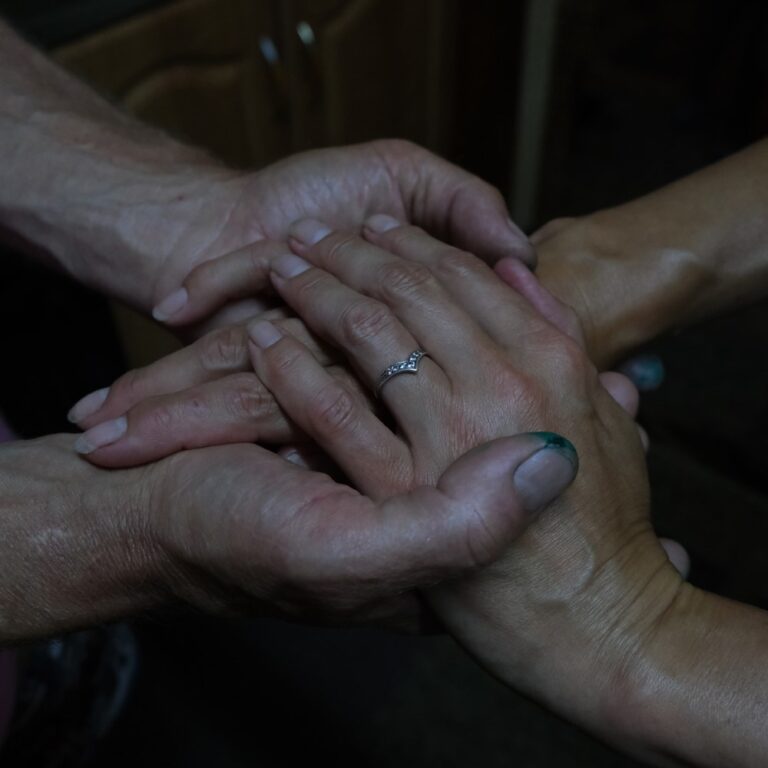
This is a report about two people who managed to flee the occupied town of Oleshky amidst the chaos following the Russian explosion of the Kakhovka hydroelectric power plant. They got lucky, if one could even call it that. Residents of the flooded left bank of the Dnipro River were trapped — the occupiers were blocking the evacuation, shooting at those who wanted to get out on their own, and, of course, lying that “everything is fine, there is no need to panic.”
*
The names of the people in this story have been changed for security reasonsWe met Andrii, 56, and Yulia, 53, in Kherson the day after they arrived in the Ukraine-controlled area from occupied Oleshky. We brought them clean clothes. The couple planned to go to the west of Ukraine to visit their daughter and grandchildren. Andrii and Yulia showed me a video of them eating ice cream in Kherson for the first time in a year and a half. Then, they recalled the horrors they had experienced and started crying.
Oleshky is a town on the left bank of the Dnipro River, which has been under occupation since the beginning of the full-scale war. After Russian troops retreated from Kherson in November 2022 and blew up the Antonivskyi Bridge, communication between the town and the right bank of the Dnipro River became impossible. As a result of a large-scale Russian terrorist attack on 6 June, 2023, which blew up the Kakhovka hydroelectric power plant dam, dozens of settlements in the lower Dnipro River area were flooded or completely covered with water.
Learning about the terrorist attack on the occupied Kakhovka hydroelectric power station
“The dam has been blown up,” a friend told Andrii by phone. It was seven o’clock on a Tuesday morning. It’s about 50 kilometres from Oleshky to the Kakhovka power plant, so the sound of the explosion did not reach the town. The locals learned about the impending big water from friends who called, from Ukrainian television, or the Internet. The occupation administration didn’t inform the locals about the coming flood.
Andrii, without disturbing Yulia, got out of bed and, for the first time since the beginning of the occupation, took three guns from his hiding place. The situation could portend anything. The man felt a weight on his shoulders, contemplating the disaster he and his wife would soon face. But at the same time, hope arose inside him that all this, their life under the occupation of the Russian Federation, would finally come to an end. They had not dared to evacuate their hometown before as they believed they were too old. They did not want to leave their beautiful two-story house with a magnificent garden, and believed that the Ukrainian military was to arrive soon.
Andrii took his boat out to the yard, lowered it from the carriage and put two oars and a tarpaulin inside. He tied one end of the cable to the boat, then threw the rope into his room through an open second-floor window and secured the other end to prevent the boat from being swept away by the water.
Carriage
Trailer for transportation of cars or special equipment.He told Yulia about the blown-up dam. They then began taking out canned food, vegetables, and firewood from the basement, as they had a fireplace on the second floor. To stay updated on the latest news about the flood, they relied on Ukrainian television broadcasts accessed via a satellite dish. They were trying to understand whether their house would be completely flooded.
In the afternoon, Andrii hopped on his bike and went to investigate the situation. It was important to find a hill to escape to. While passing through Oleshky, he came across an elderly couple standing in the middle of the street. The woman was crying and the man was trying to calm her down. Andrii intervened.
“Son, we’re going to be flooded!” the woman cried out. Their children and relatives were abroad. There was nowhere to run.
“When you hear the water, come here quickly,” Andrii said, gave his address and rode on. He never saw them again.
Then Andrii and Yulia watched the news on the TV again: “…the explosion of the dam and the machine room…”, “…the disaster occurred at around three in the morning…”, “…a particular threat to the lower-lying left bank…”
Information about the expected flooding level varied.
Around six in the evening, the power went out in Oleshky. So the couple stayed at home for the rest of the day.
How the water kept coming into Oleshky
At one o’clock in the morning, Andrii heard the sound of rushing water. He opened the window and could hear dogs barking and people shouting in the distance. He and his wife went outside and saw the road was flooding. On the other side of the water, a woman with a flashlight stood watching the waves wash over the street. The couple decided to return to their house while they could still walk on dry ground — the water was rising too fast.
It was Wednesday morning, and the water in Andrii and Yulia’s yard was already a metre high. The door to the house was firmly closed, so the water was barely seeping in. Andrii went down to the basement to save a few more cans of preserves and retrieve the pumping station. Just then, the sewer pipe running through the room burst, causing sewage to gush into the basement.
The two went up to the second floor. Outside, the wind was whistling, and there was a noise coming from below — water and all the contents of the sewer were washing away the first floor. Furniture, the refrigerator, and other appliances were being swept away. Andrii made notches on the wall of the house with a knife to mark the water level. From the first night, the water had been rising by five centimetres every five minutes, but by morning, the rate of flooding had slowed.
The water was overcoming the fence, and the boat tied to the house was already drifting. Andrii untied the boat and wanted to swim to rescue his neighbours, but he could not get out of his own yard as the gate was locked with two bolts submerged under water, one at the top and one at the bottom. The man returned to the house, took a hoe and, swimming to the gate, opened the bolts with the tip of the tool.
Andrii took his neighbours to his house, where the second floor was still dry. Then he went on a scouting mission. The water continued to rise, and while he could already turn on the motor, he continued to paddle instead: the Russian military was looking for motor boats and would confiscate either the engine or the entire boat. Watercraft without motors was not suitable, due to the swift current in many places, and inflatable boats could be easily punctured.
Along the flooded streets, there was chaos: cows were mooing, dogs and cats were swimming by, and the current was carrying beehives, firewood, and garbage. Cries of “Help!” were heard everywhere. Andrii was busy transporting people from smaller houses to houses with two or more floors. It was a sunny and hot day, and many people were sitting on their roofs without any shade.
During all this time, the shelling continued: Russian artillery on the outskirts of Oleshky was firing on Kherson.
Struggling to maintain his course, Andrii accidentally collided with the side of the boat with the trunk of an apricot tree, causing a swarm of bees to descend upon him. Swiftly, he grabbed a tarpaulin, wrapping himself tightly within it as he sensed the bees attempting to breach his makeshift shield. After a tense moment, the bees relented, allowing Andrii to continue on his journey.
There were many more bees flying around from the flooded hives, many of them also became homeless.
In the morning and afternoon, there were almost no boats on the water.
While swimming down the street, Andrii heard a hoarse cry. He looked around. Then he heard a woman’s voice come from an old house. The man saw a grandmother looking out from the attic from the triangular cut-out of the mansard. He began to call her to the boat, and the woman jumped out of the door on the other side of the attic.
“Take me to Lyuba,” she said. Andrii started rowing to the neighbouring house. Lyuba, the friend of the grandmother, was sitting on the roof. However, the house was too high for Andrii to transfer the grandmother there safely. Instead, he suggested placing her on another nearby tall building where the ascent would be easier.
“No need! If I die, then it’ll be in my house,” she said and agreed with Lyuba that some man would come by boat and take her from the attic. So Andrii took his grandmother back, having neither the strength nor the time to argue.

Many people asked for transport, but most men refused. Andrii primarily saved women with children or the elderly. Navigating obstacles, persuading people to get into the boat, waiting for them to gather their belongings, and finding a way to safely disembark all took up precious time. Unfortunately, there was no time to discuss rescuing animals, even though many people pleaded to save their cats and dogs.
Andrii swam past the tall rose hedge that lined the road. Two-thirds of the bush was submerged, with rose petals floating on the water. Nearby, on a raft nailed to a wall, a brown dog sat helplessly. Andrii had to keep swimming.
It was then Andrii saw two boats with Russian soldiers sailing past the drowning people in Oleshka. One approached him.
“Do you have a working engine?” he asked.
“No. As you can see, I’m rowing with oars,” answered Andrii. The invaders swam away.
By the evening, rescuers among the locals increased. The Russian military, though, did not help the people. One guy made a raft by tying empty plastic bottles to a pallet. The man was rescuing animals, he even managed to pull a hedgehog out of the water. Residents of the city called their relatives, friends and acquaintances directly from the rooftops and begged to be rescued.
It stopped, damn it!
In the evening, Andrii sat at home with Yulia and the neighbours again, illuminating the front wall with a flashlight. He was looking at the last mark he had placed a few hours ago, now slightly covered by water. He looked again and at half past one in the morning he shouted:
“It stopped, damn it!”
The water really stopped rising, and in the morning it fell by 50-60 centimetres.
There was no thought that dry areas could still remain in Oleshky, because it seemed as if water had flooded the entire city. However, in the morning, Andrii swam in the direction opposite the Dnipro River and discovered that there was still land near the hospital. He began taking people there, starting with the neighbours who had been in his house, and then rescuing others. By Thursday, he had helped evacuate about 12 people.
In some places, the depth had reached four metres, only the crowns of trees and the roofs of houses protruded above the surface. Andrii swam at the height of power poles, occasionally getting tangled in the wires.

On Thursday, the street became much quieter.
“Is there anyone alive?” Andrii shouted, swimming through the blocks. Only dogs barked back. Many were still around: some floating, others clinging to bits of land or any objects that had accumulated, forming tiny islands of salvation.

On Thursday, pallets, concrete mixers, refrigerators, wooden decks, etc. floated with the current. One of the neighbouring houses was torn loose and drifted out to the open sea. The water was swirling violently.
In the evening, Andrii noticed that the current had carved out a wide corridor leading to the river, about 50 metres wide, opening a path to Kherson. However, due to the one-metre difference in water level, it was dangerous to sail there. Nevertheless, hope was growing inside him. He returned home.
Yulia was terribly afraid of water and even before the war hardly ever got into a boat, so she didn’t want to entertain her husband’s suggestion of getting out of Oleshky using the newly emerged path. But Andrii insisted, saying they just needed to cross the riffle, and then rescuers would be waiting beyond.
“It’s like we’re in Venice!” he joked. After looking at the faeces floating among the children’s toys, and then at her flooded luxurious garden, grown with painstaking work, Yulia agreed.
Riffle
A shallow section of a riverSailing from occupied Oleshky to freedom
The final decision was made on Friday morning. Andrii launched the backup inflatable boat into the water and tied it behind the motorboat with a sturdy television cable. At this time, there were still two neighbours left in the house. Andrii offered them to join. Two people could fit into the inflatable boat. But they categorically refused — it was too dangerous. They asked to be dropped off near the hospital, and Andrii agreed. When he returned, he and Yulia hastily gathered their belongings, packing their wedding suits, two favourite photo albums, an acupuncture mat, plush bunny, and toy dog that their grandchildren used to play with into the rubber boat. Andrii grabbed the branded box from his phone — in the chaos, it was difficult to rationalise the decision.
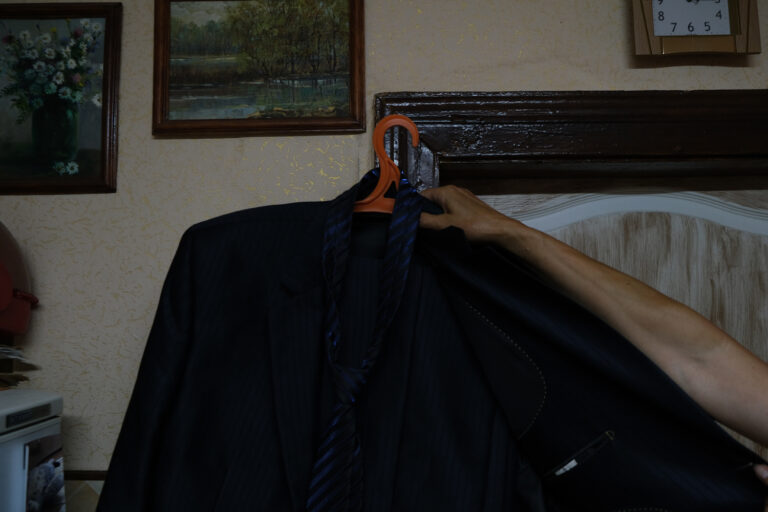
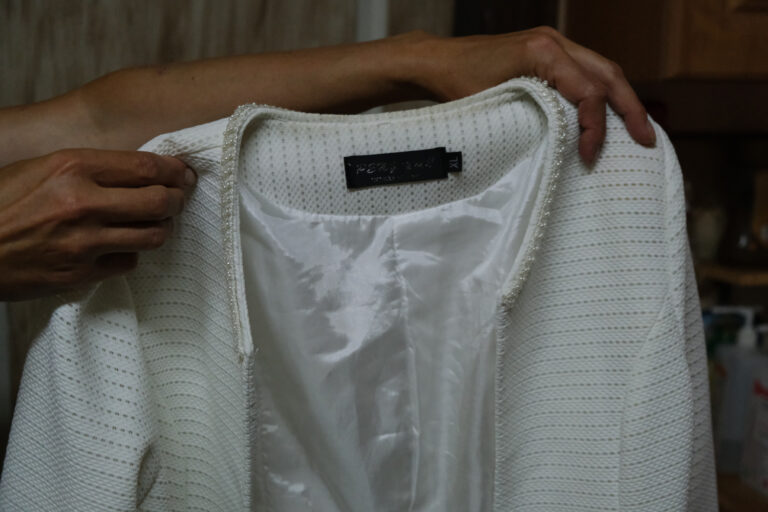
slideshow
They took two bright flashlights.
“If we get carried out into the open sea, we’ll use them as beacons,” joked Andrii. Or maybe he wasn’t joking.
Their drinking water wasn’t in bottles, but in jars, so Yulia wrapped them in white towels and handed them down to Andrii from the window. The towels could serve as white flags if needed. From their food supplies, they only took a bag of walnuts. They also took three guns with ammunition as a “gift” for a Russian patrol. Yulia sat in the boat wearing a pink t-shirt adorned with plastic pearls and jeggings. Instead of a lifebuoy, they had a car tire. Andrii wore a t-shirt, shorts, and rubber boots. Both of them wore wide-brimmed beach hats on their heads. They set sail around half-past seven in the morning.
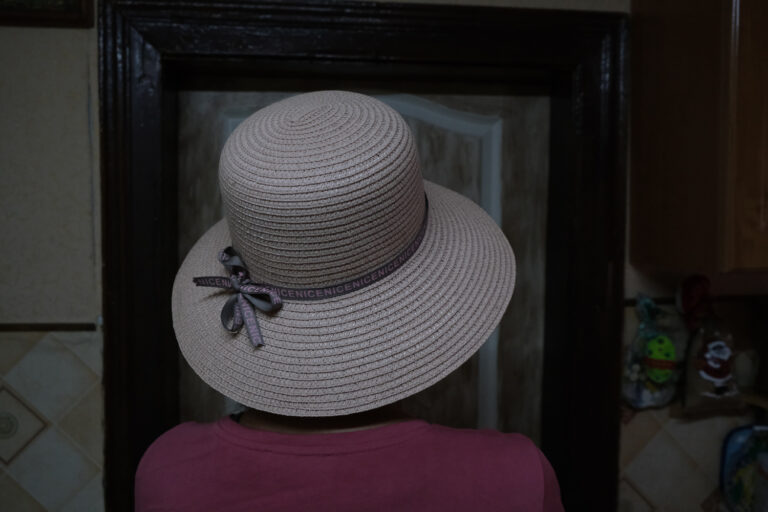
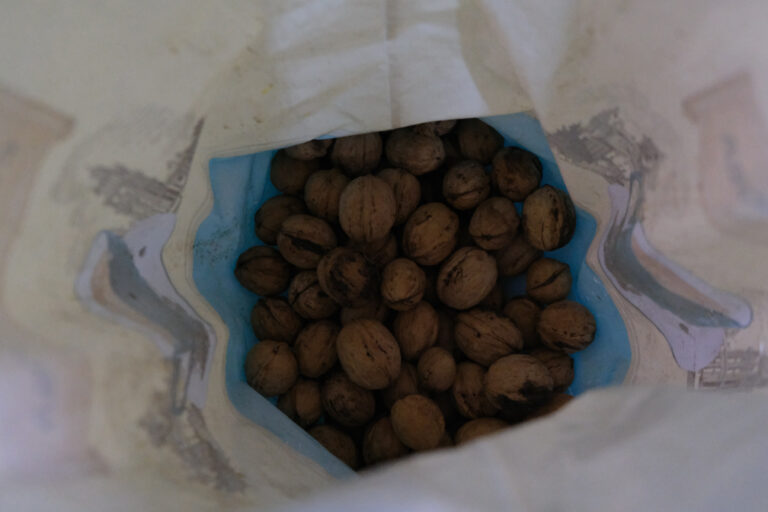
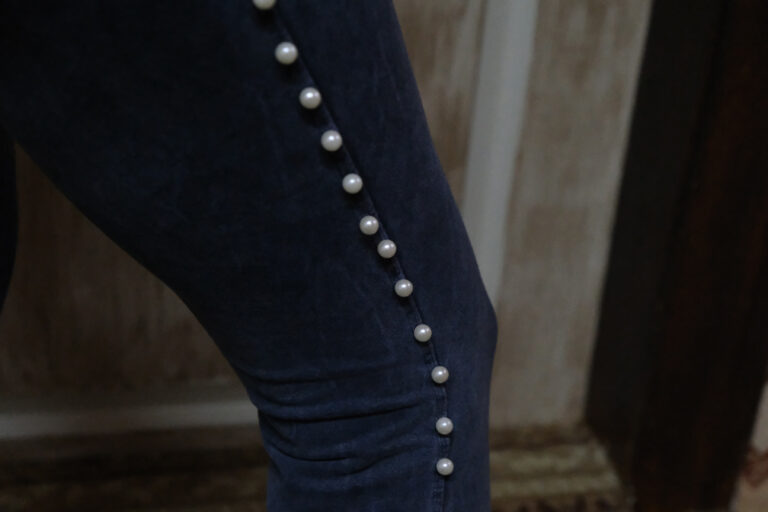
slideshow
On the roof of one of the buildings they were passing by, a woman shouted:
“Just don’t forget about us!”
Yulia looked at her and silently pointed towards the Dnipro River.
“I understand,” the woman’s expression shifted between understanding and despair.
Overnight, the water level dropped even further, the rapids diminished, and the channel itself widened by 20 metres. However, the current remained strong, pulling the boats into a whirlpool. Andrii grabbed onto an electric wire stretched between two poles and, holding onto it, slowly descended downstream — away from the whirlpool, but towards an acacia tree. This caused the inflatable boat to collide with its thorny top. The items inside were lightweight, so it continued to float, albeit slightly tilted. But Andrii couldn’t help but think that if they had taken two more people with them, the inflatable boat might have sunk.
Having aligned both vessels, Andrii swam into the forest and moved further between the trees so that Russian patrols or snipers would not see them. Further, behind the submerged islands, a view of Kherson opened up, rising far, far away on the other shore.

Now Yulia realised that no one was waiting for them near the riffle — Andrii reassured her to convince her to get into the boat. Then they had to paddle to the other side on their own. But Yulia no longer cared about that. And the fear of water completely disappeared.
To make it more difficult for the Russian military to shoot them, they decided to swim diagonally, against the current.
Suddenly the rope snapped, and the second boat began to drift downstream. Yulia grabbed the television cable to hold the boat with the belongings. For the rest of the journey, she kept it afloat.
Between the banks of the Dnipro, there were islands with summer cottage communities, including two-story houses visible from the water. The couple feared that Russian military personnel might be lurking there, so Andrii nudged the rifle closer. As they approached the first island, the boats began to drift away. While Andrii attempted to hold onto the motorboat, his wife firmly grasped his hand.
“The land is floating!” Both of them watched as the entire island began to drift with the current. Their hair stood on end. Andrii tried to steer away from the whirlpool that swept the entire island away. Meanwhile, the land continued to float along with trees and rocks – straight into the sea.
But in a minute it turned out that it was not the island floating, but the boats being carried in the opposite direction. Andrii tried to swim against the current, but the current turned out to be so strong that it still carried them downstream.
From the direction of Olehky, a drone appeared in the sky. They looked to see if it was armed with a grenade, but they could not see clearly — the “iron bird” hovered against the sun. Andrii steered the boats further towards Kherson, and just before reaching the city, they encountered a swift current that began to carry them away along with the rapids. They had to turn back and anchor near a concrete pillar with a blue and yellow flag. They anchored and waited for rescuers to notice them. Drones continued to fly in the sky. One of them hovered over the two boats.
Andrii untied the ship and began to slowly drift between the trees, hiding in the bushes: if the drone came with a grenade, it would be more difficult to drop it. A snake fell from one tree directly into the boat. Yulia began to scream, while Andrii threw it overboard with a light swing.
Finally, they spotted a military boat heading toward a concrete pillar with a flagpole. There are two soldiers on the ship. Identification marks were not visible from afar. Andrii and Yulia hid behind a bush, so the boat sailed past.
Another “bird” flew up from the Kherson side and hovered over the pole with the flag. Yulia started to wave at it. The military boat returned. It turned out to be a Ukrainian military boat. The guys from the boat transferred Yulia, attached two other boats, and towed them to the shore.
Andrii took out his phone to film a video.
“This is what freedom looks like,” he said, looking at the green slope of the port city.


